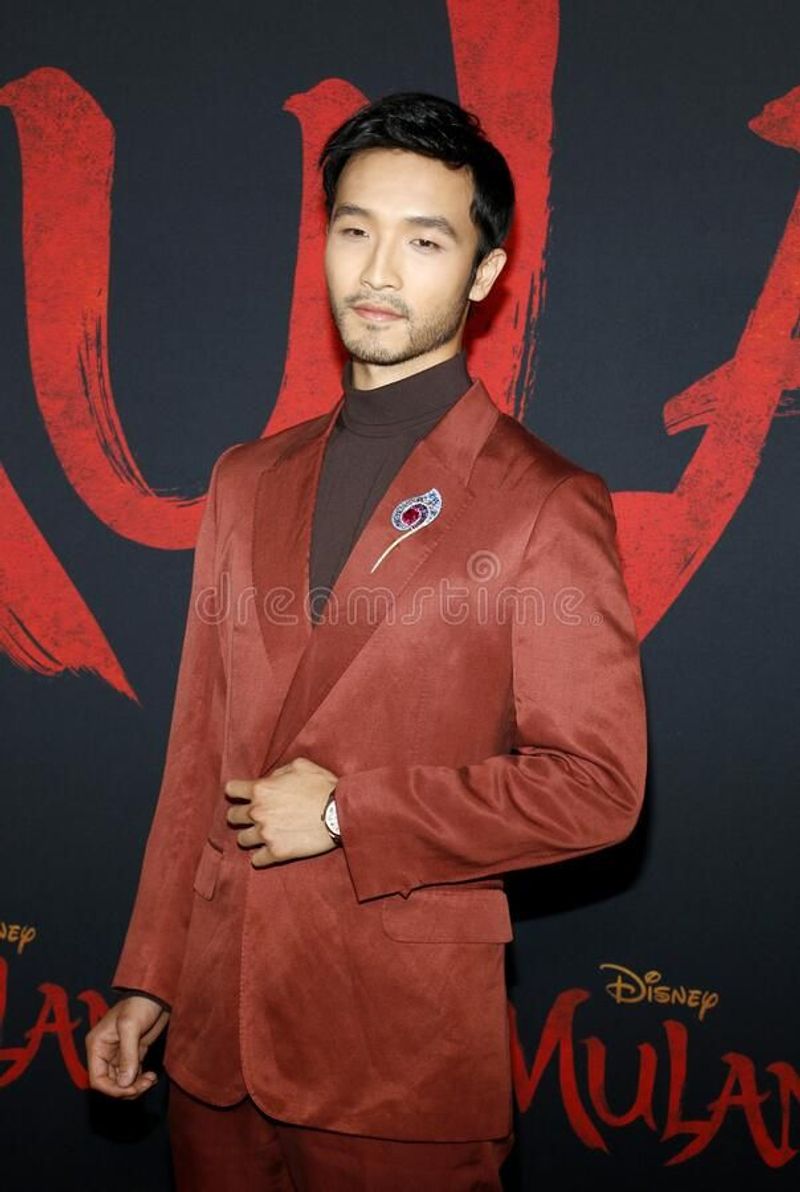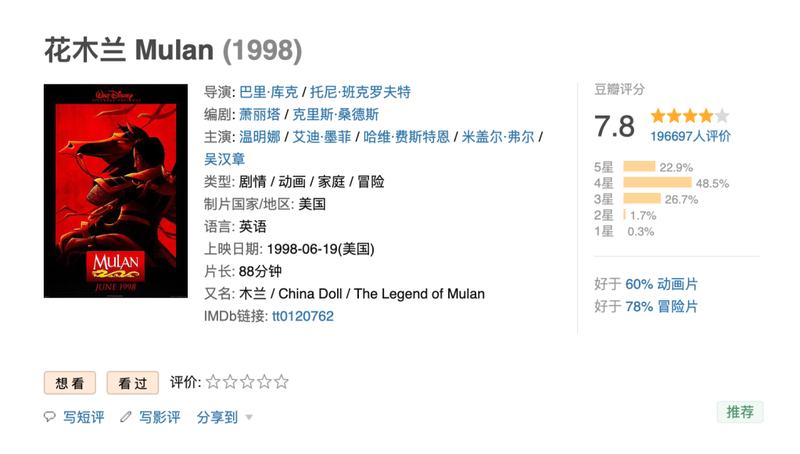icon
password
Multi-select
tags
ID
type
status
slug
summary
category
date
Author
URL
As a result, some Chinese film critics joke that instead of looking for Chinese elements that are misused in "Mulan," it is better to find out which elements are used correctly, which requires much less work.
Disney’s new film “Mulan” was released in Chinese on Sept. 11 and received a lot of nagetive reviews as expected. On the rating website Douban, the film`s score is as low as 4.9 out of 10.
Needless to say, “Mulan” has not achieved good word-of-mouth and box office results in North America. However, why don’t Chinese people like such a film shot in China, which uses Chinese actors and involves a lot of Chinese elements?
The film knows nothing about China
As many critics have mentioned, Mulan has made a lot of very low-level mistakes in its use of Chinese cultural symbols.
One thing that Chinese audiences are often dissatisfied with is that all kinds of foreign films and television works do not understand the territory of China. Due to the huge area, traffic in ancient China, especially in war, the time is by no means measured in days, but usually in months. The time performance in “Mulan” feels like the story happens in a few days, and the characters even do not need to change their horses when traveling from the northern border to the capital, which is almost impossible in terms of China’s geography.
Mulan’s Chinese mainland poster (left) has been criticized for using the poster style of Chinese TV dramas made in the 1990s(middle and right). This is no longer in line with the aesthetic of contemporary Chinese consumers.
This mistake combined with the chaotic cultural elements in the film makes everything even more bizarre. At least three main scenes are shown in the film: the Fujian Tulou where Mulan and his family live, the capital where the emperor lives, and the border where the snow-capped mountains can be seen in the north. In fact, it is over 2000 kilometers in a straight line from Fujian to the northern border of China. It is just not possible for people to travel like the characters in the movie. Mulan travels so fast that the Chinese audiences even suspect that she is actually on a plane.
Mulan’s wedding costume can be interpreted as an attempt to restore ancient makeup, but the actual effect is neither Chinese nor good-looking, as if deliberately acting ugly. In fact, nowadays, many researchers and even businessmen in China are trying to “imitate ancient makeup”, and directors will never design such a bizarre look if they refer to the opinions of Chinese “ancient costume lovers”. Similarly, the weapons and armor of soldiers and the appearance of emperors are neither elegant nor good-looking. From the Chinese point of view, I think that there is a lot of room for improvement in most fashion designs in Mulan. I wonder what the western audience will think.
Phoenix, which has been guiding Mulan, is similar to Chinese Fenghuang in the image, but its connotation is quite different. This Phoenix combines the spirit of the undead birds in Western legends, the resurrection of Bennu in Egyptian legends, and the Nirvana concept of Buddhism from India. It is a cultural hodgepodge, not something exists in Chinese culture. This symbolic difference is very much like the relationship between dragon and loong.
Mulan’s suspected boyfriend’s appearance and costume are neither in line with the ancient Chinese aesthetic of men, nor with the modern Chinese aesthetic of men. Of course, we should not comment on people’s looks, but in the context of Chinese drama, this appearance may be more suitable to play the villain small potatoes, not like a soldier who wins honor for the country, let alone to play the leading role.

There are more details, such as a soldier whose name is “cricket”, which is not even a possible nickname in Chinese, although crickets do have a place in Chinese culture. The ancestral temple of the Mulan family is actually dedicated to “heaven, earth, monarch, relatives and teachers”. There should not be oblations in there, but the memorial tablet of the family ancestors should be worshipped in the ancestral temple. Mulan accepts the conscription, and the camp she signs up for is the “Zuchong Prefecture”, an institution that only appeared in the Tang Dynasty and did not exist in the Northern and Southern Dynasties when the story happened. Moreover, this organization is the supporting organization of the government military system, hence it is incompatible with the background.
As a result, some Chinese film critics joke that instead of looking for Chinese elements that are misused in “Mulan,” it is better to find out which elements are used correctly, which requires much less work.
Don`t play with cultural symbols you do not truely understand
In fact, the above problems are all minor ones. Even if a historical film and television work is filmed by the Chinese themselves, historical mistakes, especially clothing and props, will be singled out by the audiences. China’s history is very complex and voluminous, so we can’t ask filmmakers to restore it perfectly-not to mention that even if it is restored perfectly, it may not look good as a commercial film.
Moreover, “Mulan” is not written by Chinese directors, and our requirements for its historical refinement should be appropriately reduced. However, when we go deeper and ignore all those details, the problem of Mulan is even bigger.
The screenwriter of “Mulan” seems to want to express such a complex spirit: a universal value that is not considered barbaric and backward by the contemporary audience, coupled with the unique moral idea from the ancient Eastern dynastic. But as a result, the outcome has greatly offended the contemporary Chinese audience.
It is just so twisted.
Mulan is a character that can be interpreted in many ways. In folklore, although the story of Mulan is very rebellious, the spirit of Mulan is extremely traditional: Mulan joined the army on behalf of his father out of “filial piety” and winning glory for the country out of “loyalty”. Mulan’s female identity does not affect the expression of the whole story, but highlights these two core morals.

The animated Mulan got a high score of 7.8 on Douban (China’s IMDB). The Mulan 2020 scored only 4.9 and is still falling.
Disney’s previous animated version and today’s live-action movie version of Mulan certainly cannot and should not be based on traditional Chinese culture, which is out of date even in today’s China. After the founding of New China, loyalty and filial piety, the traditional Confucianism, were once criticized as backward, decadent and even antisocial. After the cultural atmosphere of the whole of China is no longer so radical, these ideas are no longer regarded as poison, but most Chinese still maintain their criticism of these traditional morals, or at least reflect on them.
Therefore, the previous Disney animated version of Mulan, which focused on the gender liberation of women and the individual’s pursuit of personality and rights, conveyed a modern and universal concept on the basis of a traditional and national story, so it was well received. Today, when we see the live-action version of “Mulan”, we unexpectedly get back the culture of loyalty and filial piety from the dregs of feudal times.
You are reading Panda!Yoo
A blog about modern Chinese culture and consumption trends. If you are interested in Chinese food, drinks, games, movies, novels, dramas, please follow us.
Join 1,565 other subscribers
As a result, this obsolete culture of loyalty and filial piety fails to please the ancient Chinese, no need to say modern Chinese. In my opinion, the “Mulan” movie is not as good as the animated version, which emphasizes gender, personality and family, and makes a more modern, universal story. Nowadays, the emphasis on “loyalty, bravery and seeking truth” is not a slogan that ancient Chinese would shout, and the final outstanding “filial piety” is difficult to be accepted by contemporary audiences all over the world, which is redundant.
The reason why the screenwriter will do this, I am afraid, is the one-sided and shallow understanding of Chinese culture. As a result, it is not surprised that the film can only output odd and twisted Chinese cultural symbols. At that time, the animated version of “Mulan” simply gave up deconstructing the traditional culture of China, yet the effect was much better than the new movie.
Just don`t try what is bound to fail. This is the key to success.
It is just not a good movie
In addition, what the audience can’t stand more is that the quality of the film is not high, which is nothing to do with the culture.
Throughout the film, there are a lot of fighting and war scenes. However, whether it is a small-scale fight or a confrontation between the two armies of hundreds of men, it is not real nor fantastic, not Western nor Eastern.
Fantasy elements are filled with the plot of the feature film, and often promote the development of key plots. In order to please the Chinese audience, the film adds the element of “Qi”, which seems to be a Chinese martial arts concept, but it has little effect on the development of the plot. Removing it will make the film more simple and easy to understand.
The snowy mountain decisive battle and the Imperial City assassination like a child’s play, which do not conform to any country or nation’s memory of the war. The cavalry going into the battlefield, the use of trebuchet, and the scale of the imperial city guards are not only not in line with Chinese history, but even with the general reality of all mankind.
The use of several famous Chinese actors is also intriguing. Gong Li’s role is completely reduced to a tool to serve the plot, and she lacks reasonable performance as a person. Donnie yen and Jet Li, two famous kung fu stars, play characters with good kung fu, but they have little effect on the plot. Zheng Peipei’s role as a matchmaker inevitably makes Chinese audiences feel extremely uncomfortable-because Zheng Peipei’s classic roles in the past are too strong and too important, yet here she is so insignificant.
So, what is the biggest disappointment of Mulan for Chinese audiences? I can say that it has little to do with the misuse of Chinese elements, but because the film itself is not good enough, that’s all.
- Author:NotionNext
- URL:https://pandayoo.com/2020/09/14/why-do-chinese-people-dislike-mulan-so-much
- Copyright:All articles in this blog, except for special statements, adopt BY-NC-SA agreement. Please indicate the source!